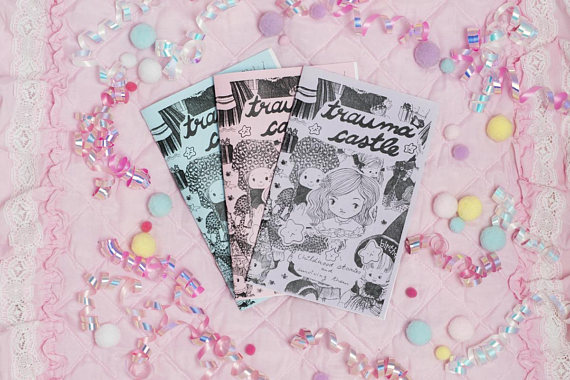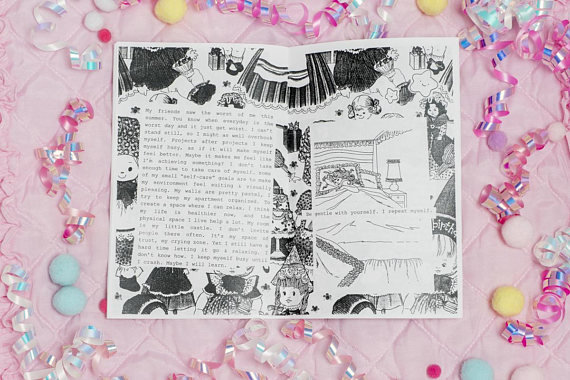
Get Trauma Castle at FemmeCrimesDistro
This little collage article is especially for my HUSBAND and my DAUGHTER (7) who continually question why I say “zine” instead of “book” or “magazine.”
I’ve tried repeatedly to explain it to them (but maybe I need your help?).
They of course seem to have been born BEFORE and AFTER the girl “grrl” zine boom that I was so affected by.
They don’t seem to like the word.
They act as though I made the word up.
I didn’t.
We both know that.
A Brief Definition of Each
- BOOK – a written or printed work consisting of pages glued or sewn together along one side and bound in covers. The Old English word originally meant any written document.
- MAGAZINE – a periodical publication containing articles and illustrations, typically covering a particular subject or area of interest.
- PAMPHLET – a small booklet or leaflet containing information or arguments about a single subject.
- ZINE – most commonly a small-circulation self-published work of original or appropriated texts and images, usually reproduced via photocopier. Usually zines are the product of a single person, or of a very small group.
Could these words be interchangeable?
Sure.
I can buy a chicken by searching for chickens on Craigslist.
However if I want to buy a rooster specifically, I will have a hell of a time finding one by searching “chicken.”
So while you might say a zine is a type of book or magazine, it is categorized as a zine.
A word I did not make up to be cute.
To be fair, I make up a lot of words.
Generally speaking, these words are used to communicate my aesthetic appreciation for our animals.
So yes, they could also be referred to as forms of baby talk.
(I’m sure you understand.)
As Issuu says:
Let’s start off by defining magazines. Magazines are a print or digital periodical publication featuring a collection of content. Typically, magazines tend to have one specific focus across all of their issues –– fashion magazines focus centrally on fashion, food magazines on food, etc. Magazines have been around since the 1600s and have taken many forms: free or paid; weekly, monthly or quarterly; digital or print.
So if “zine” is short for “magazine,” are they in fact just shorter magazines? Upon first glance, one would likely say yes. But there is much more — and much less — that defines a zine.
Historically, zines have been self-published as pamphlets or leaflets as early as the 1700s. They were circulated independently by socially-marginalized groups to give voice to their opinions and beliefs. Over time this developed into an array of other topics, with the first “boom” of zines starting in the 1930s. Known as “fanzines” and “perzines,” these were started by fans of science fiction magazines who self-published zines about both science fiction and the connected fandoms behind them.
Zines boomed again in the 1970s during the rise of punk subculture, and by the 1980s the concept of zines as an art form emerged. This was heightened by “Factsheet Five,” a publication that reviewed any zine sent to it, which created a network of “zinesters.” In the 1990s came “girl zines,” originating from the riot grrrl movement. These have carried over prominently into present day zine culture.
Zines boomed again in the 1970s during the rise of punk subculture, and by the 1980s the concept of zines as an art form emerged. This was heightened by “Factsheet Five,” a publication that reviewed any zine sent to it, which created a network of “zinesters.” In the 1990s came “girl zines,” originating from the riot grrrl movement. These have carried over prominently into present day zine culture.
The New York Times explains why the internet didn’t kill zines:
Millions, maybe hundreds of millions, of posts are published to social-media sites each day. And yet somehow, it can feel impossible to engage with new ideas, even as our compulsive inability to stop scrolling exposes us to an unending stream of new content. Yes, you can catch tweetstorms on Twitter, watch someone’s life unfold on Instagram, do deep dives into hashtags on Tumblr or watch video diaries on YouTube that explore diverse perspectives, but the clutter of everything else happening at the same time online can make it difficult to really digest and absorb the perspective being offered.
Which might be part of the reason zines never disappeared — and are even available in abundance in 2017.

Get Trauma Castle at FemmeCrimesDistro
No Comments